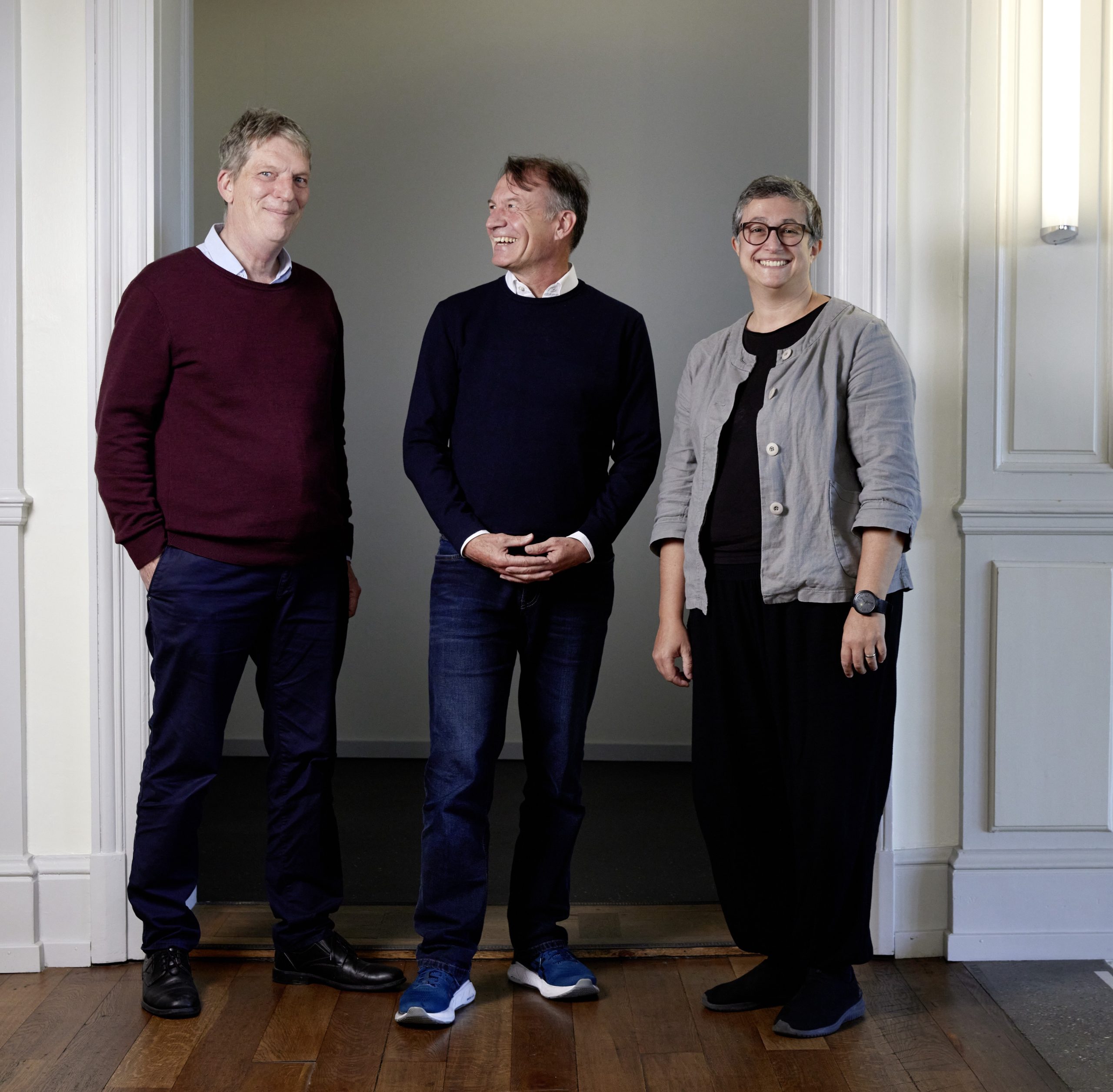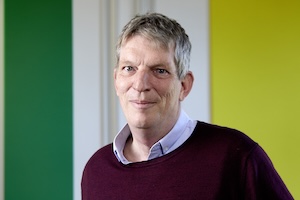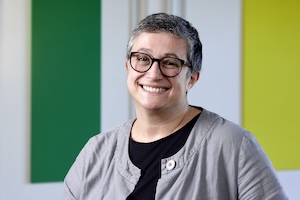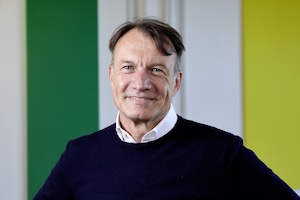“There is so much we can learn from how research is done in Africa”
Rethinking research partnerships with universities on the African continent

Three visionaries are changing how the University of Bern collaborates with partner universities in Africa. They are doing so with two prestigious Clusters of Research Excellence. In this interview, Hugues Abriel, Vice-Rector of Research, Thomas Breu, Director of CDE, and Carmen Faso, Co-Director of MCID reflect on the challenges and opportunities of creating equitable research partnerships.
The University of Bern is part of a larger effort, driven by the African Union and the European Union, which aims to strengthen research and innovation ties between Africa and Europe. What is your vision for our involvement in this initiative and how do you foresee it reshaping academic collaboration between the two continents?
Hugues Abriel: Sixty percent of the population in Africa is under 25 years old. These are bright minds who want to study, research and be part of the global scientific community, but they face too many hurdles: They struggle, for instance, with accessing journals or with obtaining visas to attend conferences. I want to reach out to them because I believe we cannot do without their contributions in the future.
Thomas Breu: Global challenges, such as climate change, do not stop at national borders and knowledge is crucially important to sustainable development. Moreover, Africa is the knowledge market of tomorrow; China, the EU and the USA are all ramping up their research cooperation with African partners.

“Global challenges, such as climate change, do not stop at national borders”
Thomas Breu
Hugues Abriel: What would you say to people who ask: why did you not do this before?
Thomas Breu: The CDE and its partners in Africa have been working on sustainability issues for over 30 years. We have a network of permanent offices in Africa, Asia and Latin America that is considered a role model for partnerships in research and education. For us it was natural to base our Cluster of Excellence on our long-standing partnerships with the Universities of Addis Ababa and Nairobi.
Carmen Faso: Infectious diseases have been drivers of technological advancement and social change – this has been true for 1000s of years. COVID-19 has been an accelerator in funding international partnerships in genomics. In a way, research in genomics is the silver lining of the catastrophe that is infectious diseases.
We have been wanting to create something like the Clusters of Research Excellence for a long time, but it would have been very difficult to justify spending major amounts of money on strengthening research capacity and infrastructure without having the right European political context. It took the lobbying power of The Guild of European Research-Intensive Universities and the African Research Universities Alliance (ARUA) to open channels of communication and prepare the ground for funding opportunities.
How can one imagine these Clusters of Research Excellence working in practice?
Carmen Faso: Cutting-edge research is happening all over the African continent. Together with the Universities of Stellenbosch and Tübingen, we co-lead a Cluster of Research Excellence on genomics in African healthcare that consists of 14 partners. We want to harness the power of genomics to systematically analyse genes and survey infectious diseases. Unlike in Thomas’s case we are starting from scratch.
Our aim is to establish a track record of collaboration with four key activities: First, right now we are writing a memorandum of understanding to formalise our principles of equitable collaboration. Second, we are initiating joint fundraising efforts, which is important to give everyone involved a sense of ownership. Third, we are bringing together online teaching material and giving everyone access. Fourth, we are working towards a joint PhD programme and sandwich programmes.
Thomas Breu: In our case, the choice of topics and research priorities were defined by our long-standing partners, led by the universities of Addis Ababa and Nairobi. The Cluster of Research Excellence on land and water management builds on our history of successful collaborations, with which we made huge strides in rehabilitating arable land in Ethiopia. We want to draw on this experience, scale it up and continue restoring ecosystems, which contributes to food security in the face of climate change.
For our cluster, funding graduate education is very important. We want PhD students from our partner universities to be able to join the International Graduate School North-South as full members. We are also doing research exchange programs for more senior academics at CDE. Rather than building up new structures, I believe that we should integrate our Cluster of Research Excellence into the existing institutions at the University of Bern and develop them further.

“The focus on early career researchers is central to what we are doing”
Carmen Faso
How will your Clusters of Research Excellence ensure that this is not just a short-term initiative but a lasting, mutually beneficial relationship?
Carmen Faso: The focus on early career researchers is central to what we are doing with the Genomics for Health in Africa cluster. One of the first things we discussed was establishing a joint PhD programme. We want to build capacity on a continent that has perhaps the largest potential for knowledge exchange. These are bright young people who are just waiting to connect to the global research community.
We had exchanges and lab visits from PhD students in the past, but they have never been institutionalised. Now the University of Bern has granted us seed funding to initiate a scientific exchange programme that will allow African PhD students to come to the MCID and vice versa. It is important to me that this training is bidirectional in a way that benefits everyone involved.
Thomas Breu: Having worked in many African and Asian countries, the key ingredient for me is trust. Building trust means accepting different research cultures, perceptions and sometimes tolerating a level of frustration. Probably, the others are frustrated with us too. If the money comes from the North, we should be careful that we do not impose an agenda on our colleagues from the South.
There is so much we can learn from how research is done in Africa: We still are a bit confined to our ivory tower, meaning our research is sometimes a bit detached from society. In Africa, scientists see themselves as part of society and their mission as contributing through excellent research to its advancement.
If you think five or ten years ahead, where do you see your Clusters of Research Excellence?
Thomas Breu: My ideal scenario is ambitious: within the next five years we want to establish an institutionalised joint endeavour with a long-term perspective. This should serve as a hub for African and Swiss researchers and beyond. Doing so will help tackling global development challenges, which lies in the interests of Africa as well as Switzerland.
Carmen Faso: What I would like to see is a joint PhD programme and firmly established research projects with dedicated funding. We speak of these Clusters of Research Excellence, but right now they only exist in a virtual space. I would love to see an actual research site – a home for our cluster. I think we need a place where everybody comes together to meet, teach, and run joint experiments – this would be a dream come true for me.

“These are bright minds who want to be part of the global scientific community, but they face too many hurdles”
Hugues Abriel
Hugues Abriel: I fully support both Clusters of Research Excellence and would like to encourage you to involve our African diaspora here at the University of Bern. Building stronger ties with universities in Africa makes our university more international, our community more diverse and helps us conducting cutting-edge research.
Join the University of Bern “Initiative Afrique” Sounding Board
Are you passionate about building and developing our relations with African universities? Hugues Abriel, Vice-Rector for Research, invites members of the university to join the conversation and help shape the future of our African partnerships. Please contact us via afrique.research@unibe.ch.
Find out more about the Africa-Europe Cluster of Research Excellence (CoRE)
The Genomics for Health in Africa (GHA) cluster will harness the potential of genomics to revolutionise healthcare for both infectious and rare non-communicable diseases in Africa. In combination with biochemical, biophysical and structural analyses, genomics serves as a powerful tool for precision medicine and personalised treatment approaches.
The cluster will contribute to capacity building for genome-based diagnostics for rare diseases, including cancer and infectious diseases, which together with the study of protein structures helps with drug treatments and vaccine development. The CoRE GHA is led by the Multidisciplinary Centre for Infectious Diseases (MCID) at the University of Bern, together with Stellenbosch University in South Africa and the University of Tübingen in Germany.
Sustainable Water and Land Resource Management for Human Well-Being
Taking care of land and water is central to addressing global development challenges, which affect African countries particularly hard. Research and application of sustainable land management supports healthy ecosystems, helps ensuring food security, builds resilience in the face of climate change and creates sustainable livelihoods while mitigating conflicts. The Africa-Europe CoRE Sustainable Water and Land Resource Management for Human Well-Being is led by Addis Ababa University in Ethiopia and the Centre for Development and Environment at the University of Bern.
Press release “Universität Bern stärkt Forschungszusammenarbeit in Afrika”
Interview: Caspar Bienek
Images: Annette Boutellier